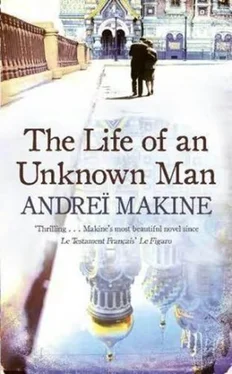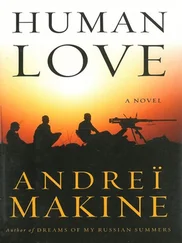Andreï Makine - The Life of an Unknown Man
Здесь есть возможность читать онлайн «Andreï Makine - The Life of an Unknown Man» весь текст электронной книги совершенно бесплатно (целиком полную версию без сокращений). В некоторых случаях можно слушать аудио, скачать через торрент в формате fb2 и присутствует краткое содержание. Жанр: Современная проза, на английском языке. Описание произведения, (предисловие) а так же отзывы посетителей доступны на портале библиотеки ЛибКат.
- Название:The Life of an Unknown Man
- Автор:
- Жанр:
- Год:неизвестен
- ISBN:нет данных
- Рейтинг книги:3 / 5. Голосов: 1
-
Избранное:Добавить в избранное
- Отзывы:
-
Ваша оценка:
- 60
- 1
- 2
- 3
- 4
- 5
The Life of an Unknown Man: краткое содержание, описание и аннотация
Предлагаем к чтению аннотацию, описание, краткое содержание или предисловие (зависит от того, что написал сам автор книги «The Life of an Unknown Man»). Если вы не нашли необходимую информацию о книге — напишите в комментариях, мы постараемся отыскать её.
The Life of an Unknown Man — читать онлайн бесплатно полную книгу (весь текст) целиком
Ниже представлен текст книги, разбитый по страницам. Система сохранения места последней прочитанной страницы, позволяет с удобством читать онлайн бесплатно книгу «The Life of an Unknown Man», без необходимости каждый раз заново искать на чём Вы остановились. Поставьте закладку, и сможете в любой момент перейти на страницу, на которой закончили чтение.
Интервал:
Закладка:
After the performance they took a streetcar, which dropped them at the gates of the city. From there the way was familiar. Two hours of walking along roads damaged by bombing, then through sleeping fields beside the Lukhta. In the still night the rustle of plants on the banks of the river could be heard. In unison with this, Volsky was softly murmuring the simple words he used to sing at the front, when marching along in a column of soldiers. Their house appeared, tinged with blue by the twinkling dark of the sky: small, stuck there lopsidedly on a hillside beneath the immense arrow of a poplar.
“Mila will soon have had enough of this shack of ours,” he thought. “She’ll come to be envious of those people at the theater who went quietly home tonight instead of trekking through the fields like us…”
She stopped, pointed at their house. “Look. It’s as if someone’s waiting for us.” One of the windowpanes had caught the gilding of the moon, a discreet and patient light, like a lamp placed there to show the way through the darkness.
During the months that followed they only returned to the city once, when Mila wanted to see “her children” again. It was the day of the first snowfall.
Behind the railings at the orphanage shadowy figures seemed to be waltzing, elated by the dance of the snowflakes. Mila recognized faces, whispered names… A little apart from his comrades stood a boy of about twelve and, with his head thrown back, his eyes half closed, he was holding up his face to the white flurries. Suddenly overcome with giddiness, he stumbled and his shapka fell off, revealing bright red hair, cut very short. He retrieved it and, as he stood up, noticed this couple standing on the other side of the railings. Mila turned away, began walking with her head bowed, Volsky followed her. After a silence he suggested in an uncertain voice: “What if we took him to live with us? And the others too…”
They did not mention it again but from then on their house seemed to be inhabited by this expectation.
Mine clearance operations had begun in August and lasted for a whole month. It was as if the sappers were unraveling a vast spiderweb around the little izba. It was striking to see how many tons of death the two armies had succeeded in burying. Every footpath was stuffed with it. Every forest glade was a trap for an unwary footstep…
As they were leaving, one of the men took them up to the top of the slope and showed them a vast hummocky area. “That’s not mines there,” he said. “Those are graves. But we’re not to do anything about them…”
Graves, contrived in a hurry, after battles. Yes, stray little mounds lost amid the folds in the ground. Here and there a name was preserved on a sign fastened to a post, the only record of a life, but the mounds were mostly mute. Closer to the ridge above the bank they found bones covered in mud and dead plants.
What they would end up accomplishing began with almost random acts: picking up a pistol in a collapsed trench, a notebook with its pages eaten away by damp that made it impossible to read… They gave themselves no plan of action, they imposed on themselves no ritual solemnity. Quite simply, day after day, they were trying to rescue from oblivion those whom they had seen shot down during their last concert.
Only once did they wonder what should be done with the mortal remains. For there were relics of German soldiers too. Helmets, the shreds of uniforms, bones, skulls… There was still bitter hatred, sustained by memories of the stranglehold on Leningrad, the towns razed to the ground that Volsky had passed through, by that immense bloodbath that Russia had become. “All those children who died because of him,” thought Mila as she touched a skull with the edge of her spade. Hatred seemed as natural as breathing. Yet the air they breathed was tinged with the acrid scent of russet leaves, the chill of the hoarfrost whose crystals shone like rainbows in the sun. On the ground the last flowers, burned by the frost, rose up among the bones. And from the pale, luminous sky there emanated a gentle aura of convalescence.
“What are we going to do with all this?” grunted Volsky. “Chuck it into a gully and forget about it?”
Mila shook her head gently. “I don’t know… They took us for savages. Animals to be exterminated. I think they should be buried the same as ours. With names, if possible. That will prove they were wrong about us.”
They did it, extending the rows of mounds, planting a young sapling brought by Volsky from the forest beside each grave. At the start of the fall they learned that the Museum of the Blockade had just been opened in Leningrad. They deposited there all that they had found during their funerary work: weapons, documents, decorations. And even a letter, preserved thanks to the silver wrapping paper from a chocolate bar. Words of tenderness written by a German soldier…
In spring this cemetery would already have the look of a copse, shining with young leaves.
From the ruins of the village Volsky collected a good amount of undamaged timber. Logs, planks, beams, the wherewithal for extending their little hut. “Two more large rooms,” they planned, picturing the children moving in. This future home was being sketched in their minds with a fine line of light.
Their own life together was like a subtle watercolor sketch, invisible to other people. They gave the world what it required of them and for the rest of the time were content to be forgotten. Mila could be seen emerging from the school, the sleeves of her dress white with chalk. Volsky could be observed cycling along the rutted roads, his postman’s sack on his back.
And one October day they could be seen running along a station platform in Leningrad, from which a local train was leaving, the only one finally put back in service. They just missed it, stopped, breathless, and saw all kinds of looks at the passing carriage windows, mocking, indifferent, sympathetic. But nobody could guess at the true lives of this couple as they retraced their footsteps, crossed the city and left it on foot, following a familiar road.
Nobody knew that they had come to bring the last relics that the earth of the graves had yielded up to them. At the Blockade Museum they had felt a great peace, mingled with bitterness. The rooms, which still resembled those in an ordinary warehouse, contained a jumble of tragic fragments from the past, from those years it was so hard to talk about. Photos, personal items, letters, exercise books in which children dying of hunger had drawn grass, clouds in summer… And the notebook belonging to that child who wrote down the date when each member of her family died.
In the middle of one room the Luftwaffe aircraft shot down over Leningrad loomed large.
The peace they experienced came from saving these fragments of truth from oblivion. But also from the gold of the leaves covering the muddy road. They walked on, happy to have missed the train and to be making their way through a luminous mist redolent of the cool of forest undergrowth. And their joy came from this perception: despite the boundless suffering concentrated in the rooms at the museum, there was still this misty day with its muted light and the pearly droplets on the woman’s eyelashes and the man’s smile, a fleeting smile, no longer to be confused with the grimacing scar from his wound.
No one could guess at this life of theirs that took its course through the fragile tenacity of such moments.
This humble beauty had no need of the fun and games set in motion by the end of the war. Parades, processions, speeches glorifying the Leader who had guided the people to victory. And the desire some had to play a prominent role in these victory celebrations.
They kept apart from this hubbub. Thanks to their solitude, their love. Thanks to the measured resonance they became aware of one December day in the snow-covered forest where they were collecting fallen timber. The wind blew strongly above the tops of the tall fir trees. But down below, seated on their bundle of firewood, all they could make out was a rustling sound: a mass of snow came tumbling down from the treetops and, as it slid from one branch to the next, found time to whisper a brief sequence of words. They did not speak, surprised to see how simple, almost poor, happiness could be, yes, materially poor and yet so abundant. A pile of snow embarked on its slippery descent down the branches, gave off a rapid whispering, fell. And the silent forest seemed to sense the presence of the woman tilting her face, eyes closed, toward the lazy fluttering of the snowflakes… Men had ripped open this earth with trenches, thought Volsky, had buried thousands of mines and then set about killing one another and the massacre had lasted four long years, and when it was over the survivors dug up the mines and went away. And the forest has once more become as it was before the killing. “And now the woman I love has her eyes closed, listening to the wind, and snow crystals settle on her face. A face which resembles that of a very thin young woman, with dark hair, drawn by a child…”
Читать дальшеИнтервал:
Закладка:
Похожие книги на «The Life of an Unknown Man»
Представляем Вашему вниманию похожие книги на «The Life of an Unknown Man» списком для выбора. Мы отобрали схожую по названию и смыслу литературу в надежде предоставить читателям больше вариантов отыскать новые, интересные, ещё непрочитанные произведения.
Обсуждение, отзывы о книге «The Life of an Unknown Man» и просто собственные мнения читателей. Оставьте ваши комментарии, напишите, что Вы думаете о произведении, его смысле или главных героях. Укажите что конкретно понравилось, а что нет, и почему Вы так считаете.









